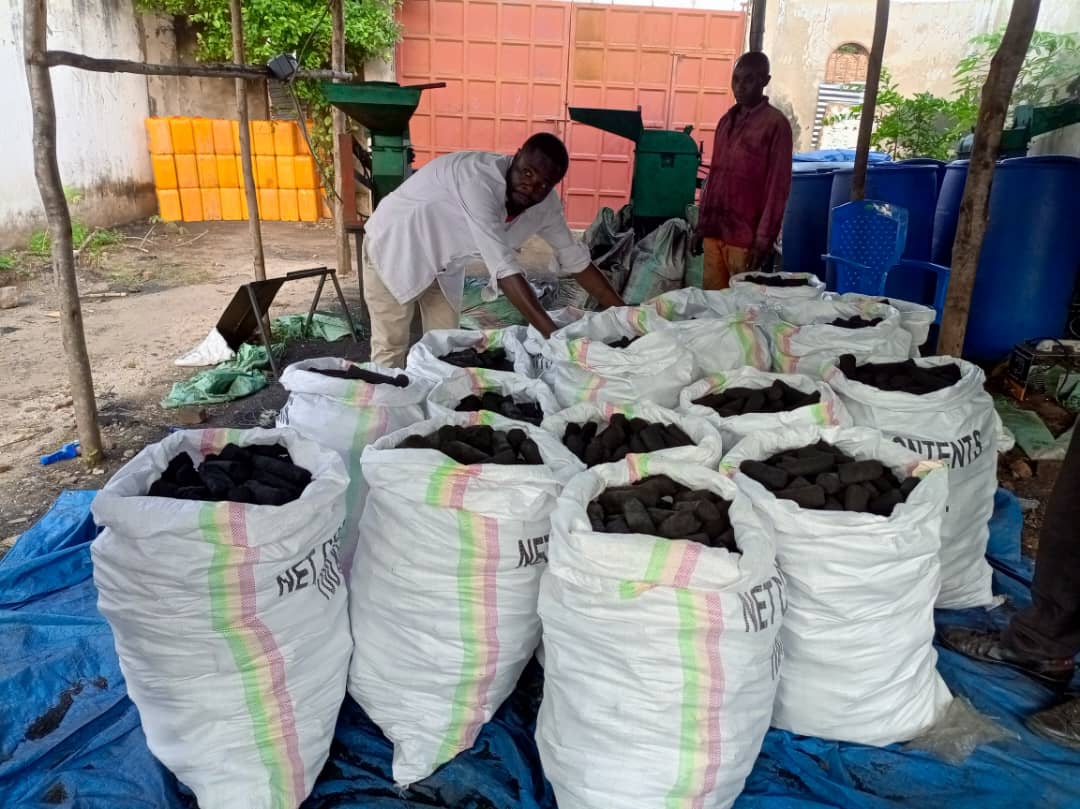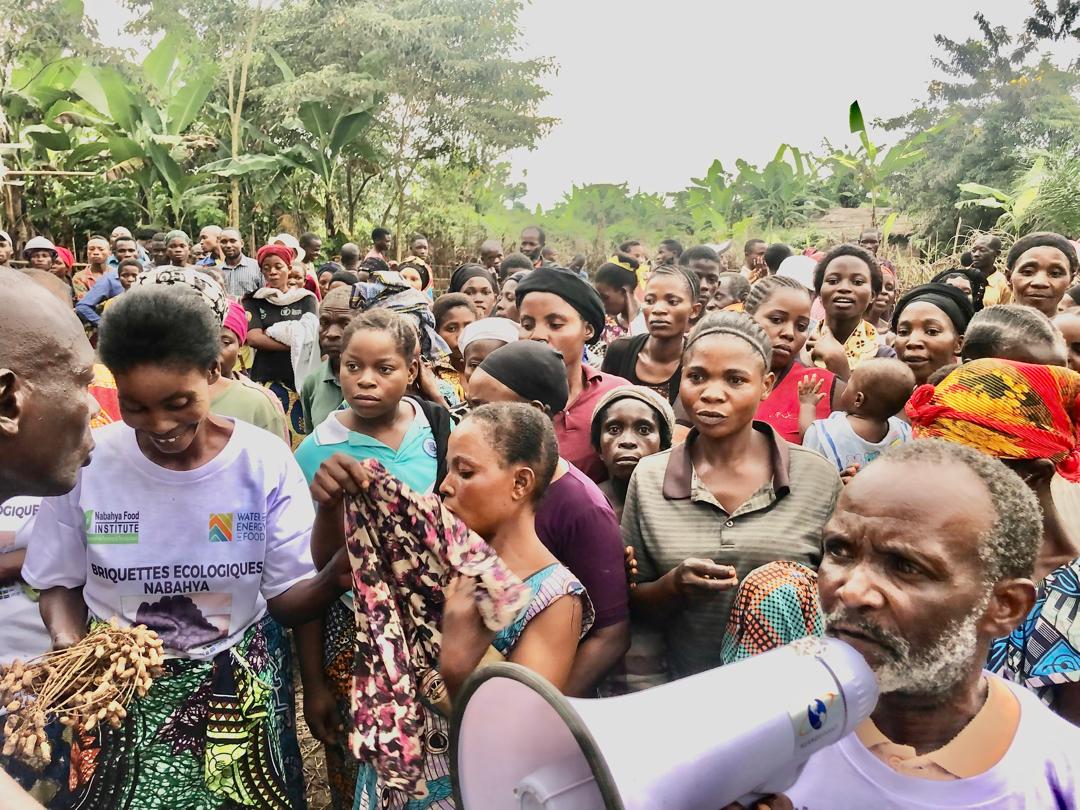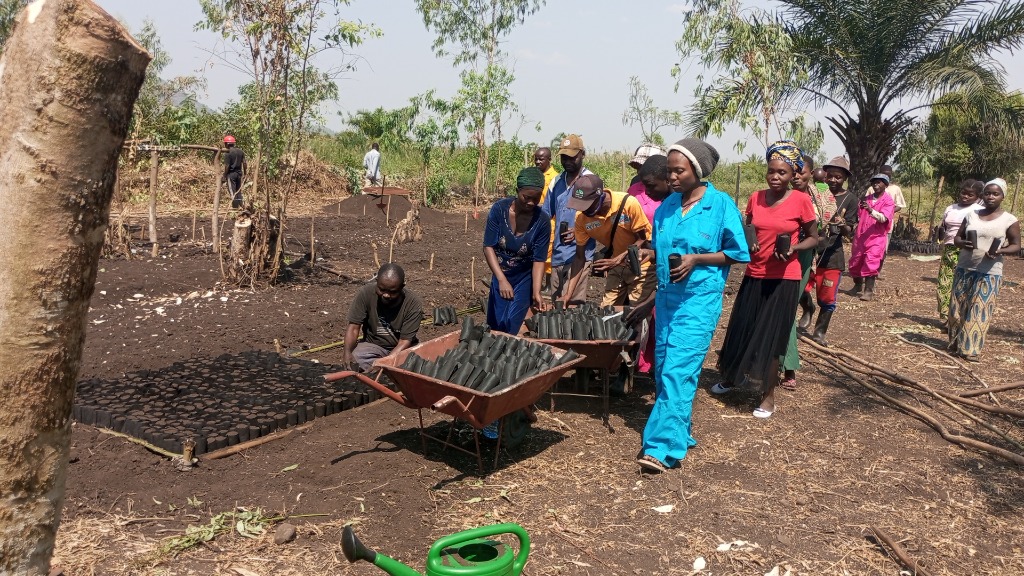From Waste to Wealth: How Briquettes are Changing Lives in the DRC
2024 LOCAL ADAPTATION CHAMPIONS AWARD NOMINEE
In the eastern Democratic Republic of Congo (DRC), rural communities face severe challenges due to the ongoing impacts of climate change. With livelihoods heavily dependent on agriculture, small-scale farmers are struggling to adapt to erratic weather patterns, deforestation, and degraded soils. These challenges directly threaten their food security and survival. However, amid these difficulties, local communities are stepping up with initiatives designed to bolster their food security resilience and adapt to the changing climate.
Local Leadership and Climate-Smart Solutions
The Nabahya Food Institute (NFI), a grassroots organization, is at the forefront of these efforts. NFI is dedicated to providing farmers with the tools and knowledge needed to safeguard their land and future. Their approach focuses on climate-smart agriculture and clean energy innovations. One of their key initiatives involves the circular production of briquettes, a sustainable alternative to charcoal made from agricultural waste such as crop residues and palm shells. Briquettes, sometimes known as ‘green charcoal’, offer a sustainable alternative to traditional charcoal. These briquettes are helping to combat deforestation as they can be used instead of firewood, all whilst addressing energy poverty.Guillain Nabaha, Chair of the Nabahya Food Institute, explains the significance of the project: "Our green charcoal briquettes are an answer to both energy poverty and environmental degradation. They’re a lifeline for communities." This simple yet transformative solution is an example of how local leadership can drive significant change in the face of climate challenges.

Briquette production
Farmers Cooperatives and Participatory Decision-Making
NFI has helped to establish a network of farmer cooperatives in eastern DRC. Each cooperative is composed of smallholder farmers who work together to share resources, knowledge, and best practices. This collective approach enhances food sovereignty, regenerative agriculture, ecosystem restoration, and community resilience. NFI provides training to farmer cooperatives on biochar, biofertilizers, biopesticides and intercropping systems. The cooperatives supply the raw materials to produce briquettes to NFI in exchange for cash or briquettes.
NFI employs a participatory approach to decision-making, involving various community forums, such as the Farmers Forum which is made up of the farmer cooperative leaders, Women’s Forum, Herders Forum, Youth Forum, and Mixed Forum. These gatherings occur every month, allowing community members to voice their concerns, identify early warning signs related to agriculture and livestock, and collaboratively develop solutions. Community members also manage funds at these gatherings, reviewing fund management, assessing the effectiveness of resource allocation, and discussing any issues that arise. This participatory process empowers the community to make informed collective decisions about their resources and leadership.

Gathering of beneficiaries
Empowering Communities through Agriculture
NFI is working to promote climate-smart agriculture practices among small-scale farmers. Through Farmer Field Schools, NFI provides training in sustainable techniques such as intercropping, the use of bio-fertilizers, and reforestation with native trees. These methods not only improve crop yields but also help restore degraded soils and support local biodiversity. This is particularly vital for women farmers, who are often most vulnerable to the impacts of climate change.
By empowering women with knowledge and practical skills, NFI is helping them build resilience, increase food production, and generate additional income through surplus crops. "We’re seeing the women we work with improve their lives in ways that were unimaginable before. They're not just farming; they're leading the charge for a sustainable future," shares one program participant.

Preparing a native tree nursery for reforestation projects
Transformative Results: Building a Sustainable Future
The adoption of eco-friendly briquettes has been transformative for the region. Over 72,000 people now use these briquettes for cooking and heating, with 54,000 households reporting significant savings on energy costs. The environmental benefits are also noteworthy. By switching to briquettes, the region has reduced over 937 tons of CO2 emissions and saved more than 4.6 million kilowatt-hours of energy. This shift not only reduces the communities' carbon footprints but also protects forests, crucial for water retention and biodiversity.
NFI’s efforts have also led to the reforestation of more than 87 hectares of land with native trees, which play a critical role in mitigating floods and landslides by improving water retention. These reforestation initiatives, in turn, enhance the local ecosystem's ability to support both wildlife and agriculture.
The scale of NFI’s work demonstrates the power of community-driven solutions in combating climate change. By integrating sustainable energy, climate-smart agriculture, and reforestation, they are building a resilient foundation for the future. As climate impacts continue to intensify globally, projects like NFI's offer a model for other communities facing similar environmental challenges, proving that local leadership can make a significant difference in the fight against climate change.